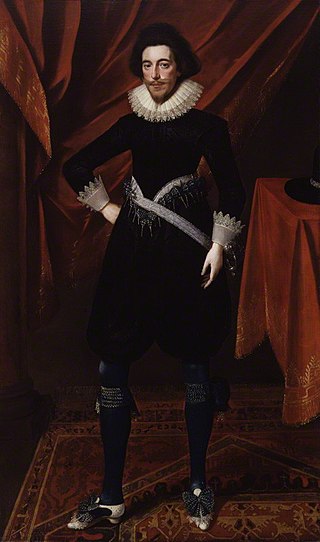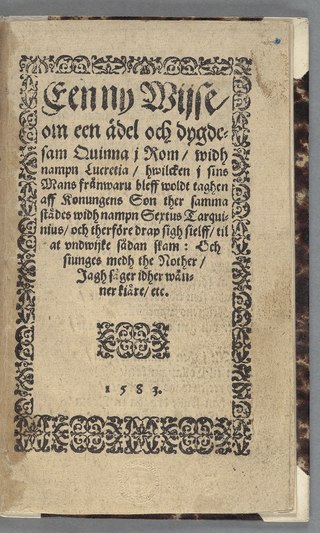Related Research Articles

The English Civil War refers to a series of civil wars and political machinations between Royalists and Parliamentarians in the Kingdom of England from 1642 to 1651. Part of the wider 1639 to 1653 Wars of the Three Kingdoms, the struggle consisted of the First English Civil War, the Second English Civil War and the Third English Civil War. The latter is also known as the Anglo-Scottish war, since most of the fighting took place in Scotland.

Robert Devereux, 3rd Earl of Essex, KB, PC was an English Parliamentarian and soldier during the first half of the 17th century. With the start of the Civil War in 1642, he became the first Captain-General and Chief Commander of the Parliamentarian army, also known as the Roundheads. However, he was unable and unwilling to score a decisive blow against the Royalist army of King Charles I. He was eventually overshadowed by the ascendancy of Oliver Cromwell and Thomas Fairfax, and resigned his commission in 1646.

Denzil Holles, 1st Baron Holles, was an English statesman, best remembered as one of the Five Members whose attempted arrest by Charles I in January 1642 sparked the First English Civil War.

The Ironsides were troopers in the Parliamentarian cavalry formed by English political leader Oliver Cromwell in the 17th century, during the English Civil War. The name came from "Old Ironsides", one of Cromwell's nicknames.

The Irish Confederate Wars, also called the Eleven Years' War, took place in Ireland between 1641 and 1653. It was the Irish theatre of the Wars of the Three Kingdoms, a series of civil wars in the kingdoms of Ireland, England and Scotland – all ruled by Charles I. The conflict had political, religious and ethnic aspects and was fought over governance, land ownership, religious freedom and religious discrimination. The main issues were whether Irish Catholics or British Protestants held most political power and owned most of the land, and whether Ireland would be a self-governing kingdom under Charles I or subordinate to the parliament in England. It was the most destructive conflict in Irish history and caused 200,000–600,000 deaths from fighting as well as war-related famine and disease.

The Wars of the Three Kingdoms, sometimes known as the British Civil Wars, were a series of intertwined conflicts fought between 1639 and 1653 in the kingdoms of England, Scotland and Ireland, then separate entities united in a personal union under Charles I. They include the 1639 to 1640 Bishops' Wars, the First and Second English Civil Wars, the Irish Confederate Wars, the Cromwellian conquest of Ireland and the Anglo-Scottish war (1650–1652). They resulted in victory for the Parliamentarian army, the execution of Charles I, the abolition of monarchy, and founding of the Commonwealth of England, a unitary state which controlled the British Isles until the Stuart Restoration in 1660.

The First English Civil War took place in England and Wales from 1642 to 1646. It is part of the 1639 to 1653 Wars of the Three Kingdoms, which also include the Bishops' Wars, the Irish Confederate Wars, the Second English Civil War, the Anglo-Scottish war (1650–1652) and the Cromwellian conquest of Ireland. Historians calculate some 15% to 20% of all adult males in England and Wales served in the military between 1639 and 1653, while around 4% of the total population died from war-related cause, versus 2.23% in World War I. These figures illustrate the impact of the conflict on society in general, and the bitterness it engendered.

Confederate Ireland, also referred to as the Irish Catholic Confederation, was a period of Irish Catholic self-government between 1642 and 1652, during the Eleven Years' War. Formed by Catholic aristocrats, landed gentry, clergy and military leaders after the Irish Rebellion of 1641, the Confederates controlled up to two-thirds of Ireland from their base in Kilkenny; hence it is sometimes called the "Confederation of Kilkenny".

Sir Robert Heath was an English judge and politician who sat in the House of Commons from 1621 to 1625.

A broadside is a single sheet of inexpensive paper printed on one side, often with a ballad, rhyme, news and sometimes with woodcut illustrations. They were one of the most common forms of printed material between the sixteenth and nineteenth centuries, particularly in Britain, Ireland and North America because they are easy to produce and are often associated with one of the most important forms of traditional music from these countries, the ballad.

David Jenkins was a Welsh judge and Royalist during the English Civil War.
The siege of Reading was an eleven-day blockade of Reading, Berkshire, during the First English Civil War. Reading had been garrisoned by the Royalists in November 1642, and held 3,300 soldiers under the command of Sir Arthur Aston. On 14 April 1643, Robert Devereux, 3rd Earl of Essex brought a Parliamentarian army of 19,000 men to lay siege to the town, and began bombarding the town two days later.
Francis Cheynell (1608–1665) was a prominent English religious controversialist, of Presbyterian views, and President of St John's College, Oxford 1648 to 1650, imposed by the Parliamentary regime.
The ordinance of no quarter to the Irish was a decree of the English Long Parliament passed on 24 October 1644 in response to the Irish Catholic Confederation threat to send troops from Ireland to support King Charles I during the English Civil War. The decree ordered Parliamentary officers to give no quarter to Irish soldiers fighting in England and Wales, and Irish Confederate sailors at sea who surrendered.
Politics were an important part of John Milton's life. Milton enjoyed little wide-scale early success, either in prose or poetry, until the production of his later, controversial political works starting with The Tenure of Kings and Magistrates and Eikonoklastes.
1643 was the second year of the First English Civil War. Politically, the latter months of the year were the turning-point of the war. The King made a truce with the Irish rebels on 15 September which united against him nearly every class in Protestant England. Only ten days after the "Irish Cessation," Parliament at Westminster swore to the Solemn League and Covenant, and the die was cast.

The Battle of Burton Bridge was fought between Royalist and Parliamentarian forces at Burton upon Trent on 4 July 1643 during the First English Civil War. By the time of the battle, the town, which had at various times been held by both sides, was garrisoned by a Parliamentarian unit under the command of Captain Thomas Sanders and the town's military governor, Colonel Richard Houghton. The key river crossing at Burton was desired by Queen Henrietta Maria, who was proceeding southwards from Yorkshire with a convoy of supplies destined for King Charles I at Oxford. The Royalists, led by Colonel Thomas Tyldesley, launched a cavalry charge across the bridge which succeeded in defeating the Parliamentarians and capturing most of their officers, including Sanders and Houghton. The Queen's convoy proceeded on its way south to Oxford, with Tyldesley receiving a knighthood and a promotion in recognition of his victory. Burton changed hands several more times during the course of the war, before finally coming under Parliamentarian control in 1646.
"A Ballad upon the Popish Plot" is an early modern English broadside ballad about a fabricated conspiracy known as "The Popish Plot" that occurred between 1678 and 1681 in the kingdoms of England and Scotland, during a period of widespread social and cultural prejudice against Catholicism. The song records an indictment of the Plot—a crucial consequence of national religious conflict that arguably began with the English Reformation—in the form of the ballad, one of the most time-honored and influential styles of popular music.
The Ballad of the Cloak, Or the Cloak's Knavery is an English broadside ballad that dates back, roughly, to the last quarter of the 17th century. It is most often set to the popular tune, "From Hunger and Cold, or Packington's Pound." The ballad is most recognized by its opening lines, "Come buy my new Ballet/ I hav't in my Wallet." Extant copies of the ballad can be found at the Huntington Library, the Pepys Library, the British Library and the National Library of Scotland.

The Storming of Farnham Castle occurred on 1 December 1642, during the early stages of the First English Civil War, when a Parliamentarian force attacked the Royalist garrison at Farnham Castle in Surrey. Sir John Denham had taken possession of the castle for the Royalists in mid-November, but after the Royalists had been turned back from London at the Battle of Turnham Green, a Parliamentarian force under the command of Sir William Waller approached the castle. After Denham refused to surrender, Waller's forces successfully stormed the castle. They captured it in under three hours, mostly due to the unwillingness of the Royalist troops to fight. This allowed the Parliamentarians to get close enough to breach the gates, after which the garrison surrendered.
References
- ↑ English Broadside Ballad Archive. "Tis A Plaine Case Gentleman". ebba.english.ucsb.edu. Retrieved 8 September 2014.